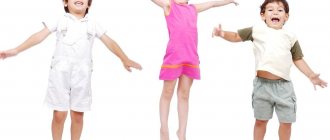Many adults believe that age-related crises in children begin no earlier than 3 years. Before this, they are too small to understand something so deeply and experience any contradictions. This attitude often turns into the first and, alas, irreversible mistakes in parenting for parents. If they did not attribute nervousness, irritability and any other manifestations of a one-year-old baby’s personality to teething, but helped him overcome the state he was experiencing, it would be much easier to solve many problems in the future.
All parents simply must know how the 1-year crisis manifests itself and how long it lasts, what its essence is and what they should do to help the child overcome the first contradictions in his life. It is at this age, if adults cannot cope on their own, that a first consultation with a child psychologist is possible.
The essence of the crisis
During the first year of life, a child goes from a small wrinkled lump emerging from the mother’s womb to an independent personality who can show his character. During this period, he has to learn so many new things that he subsequently will not learn in his entire life.
To understand that the baby is growing not only physically, but also personally, parents need to remember him as a newborn. In the first days, he cried only because he was hungry, something hurt, he was cold or didn’t get enough sleep. Most of his reactions were dictated by physiology, and life was governed by biological rhythms.
But starting from 8-9 months, everything changes dramatically. The closer your first birthday gets, the more difficult it is to manage. More and more often he cries for inexplicable reasons. He went to the toilet, slept, ate, walked, was warm, surrounded by affection and care - but suddenly he frowns and is capricious, pushing away toys and his mother’s hand. After the examination, the therapist says that there is no reason to worry, the baby is healthy. So what's the matter then?
This is how the crisis of 1 year of life begins. The child develops his first ideas about the world around him and himself. He is experiencing a state of mild, but still stress, due to the huge leap in development that he made from a newborn to this moment. He already feels like a full-fledged person, since he is aware of his own desires: he wants and asks to eat, walk, play, sleep, etc.
The connection with his mother becomes a little weaker: he understands that he can leave her for another room and eat without her breast. This factor is aggravated if it is during this period that a woman stops lactation or goes to work. It is difficult for the baby to realize that he can do without her.
The main contradiction of the 1st year of a child’s life is that he feels like a full-fledged person (in his subjective understanding). But in fact, he continues to be treated like a baby who cannot yet have any personal needs. He knows only one concept - “I want”, and that is dictated more by physiology. And the world of adults imposes something incomprehensible and unpleasant on him - “musts” and “impossibles.” The little man cannot yet fully assimilate them, although he has to adapt to the norms and prohibitions that his parents are teaching him by this time.
Conclusion one. By the end of 1 year of life, the child experiences an age-related psychological crisis, which consists in his feeling of himself as an independent person. The first contradiction he has to face is that he continues to be treated like a child who doesn’t understand anything. The second is how to connect “I want” and “need”. Third, how can you cope without your mother?
Periodization
In psychology, there are usually five childhood crises by age:
- 1 year - transition from infancy to early childhood;
- 3 years - transition to preschool age;
- 7 years - mastering school;
- 13 years - adolescence;
- 17 years old is the beginning of early adolescence.
However, this periodization is quite arbitrary. In the works of psychologists, textbooks, and various sources one can find other interpretations of it.
For example, there is an opinion that a separate newborn crisis should include the entire first year of a baby’s life, from birth to standing. In fact, every week there can be called a transition period, characterized by sharp jumps in physical condition.
According to another point of view, the crisis periods of 13 and 17 years should be combined into one - adolescence.
In some sources, the crisis of early adolescence is excluded from this periodization, since a seventeen-year-old person can hardly be called a child in the general sense of the word.
Such discrepancies in periodization should not be scary. Their descriptions are as similar as possible.
Causes
If parents were able to understand the essence of the crisis, it will be easier for them to understand its causes. This will help establish relationships with the child and jointly overcome all the contradictions of this difficult period.
Psychologists call the following provoking factors:
- a huge amount of information that needs to be absorbed and processed daily;
- the need to constantly learn something new: eat with a spoon, crawl, sit, walk, talk;
- excessive physical activity: against the backdrop of a still unformed musculoskeletal system, the child begins to walk, which is extremely difficult for him;
- the discovery of the surrounding world, which, it turns out, is not limited to a crib or one room, and you can move around it - and on your own;
- separation from parents: you can crawl and run away from them - this is the second break with the mother in the child’s life, but already conscious (the first is birth);
- refusal of the mother's breast - loss of another important psychophysiological connection with the mother;
- mastering new objects (spoons, pyramids, books, TV);
- building first relationships with others: you can ask someone to eat, but it is useless to do this with others.
From the point of view of psychophysiology, the child’s brain is constantly developing and improving, he is trying to understand what place he occupies in this huge world and how to behave in it. These are the first steps on the path of socialization, and the more confident they are, the more successful a person will be in the future. But without the help of adults, the baby cannot do this.
If previously he lived according to the laws of biological rhythms, then by 8-9 months they lose their organizational function. His behavior changes dramatically due to the maturation of brain structures and restructuring of the nervous system.
Mastery of walking, speech, manipulative and objective actions is accompanied by the formation of new mental qualities. A need for independence appears (the child understands that he can move around on his own to explore the surrounding space and objects), but there are no conditions for this. For his parents, he is still the same baby, and most of what he wants is not possible.
By analyzing each reason in detail and applying it to your baby, it will be easier for parents to understand what is happening to him. This will make it possible to more painlessly overcome the age crisis of the child’s first year of life. Psychologists and pediatricians call this factor a prerequisite for the formation of a harmonious personality in the future.
Conclusion two. The crisis of 1 year of life is a natural process that cannot be avoided. Its reasons are laid down at the evolutionary level of development of each person. Much worse is its absence, which indicates the presence of psychophysical problems. Then you will have to go with them not even to a psychologist, but to a psychotherapist.
What it is
Childhood crises are transitional stages from one stable (lytic) life period to another, characterized by a holistic change in the child’s personality, caused by the emergence of psychological new formations. To designate them, Vygotsky introduced the term “normative crises of development.”
There are many different approaches to their definition and classification (Vygotsky, Elkonin, Erikson, Leontiev, Bozhovich, etc.). Despite such diversity, they are all very similar and agree on most key points.
Psychology explains them quite simply. All children grow in leaps and bounds, during which, according to research, the brain begins to actively emit impulse waves. Scientists have yet to find out their nature and significance, but at these moments significant changes occur with mental and physical development.
Physical changes
Just yesterday he was crawling, but today he is already clumsily walking. Just yesterday I couldn’t do without outside help, but today I’m tying my shoelaces and trying to make breakfast for myself. Just yesterday my daughter was an angular, clumsy teenager, and today she has turned into a beautiful, mature girl.
Mental changes
Each age-related crisis period is accompanied by neoplasms. At 1 year - this is autonomous speech, motivating ideas, self-image. At 3 years old - primary independence, building more complex relationships, a new level of self-awareness, volitional regulation of activity. At 7 years old - arbitrariness and indirectness of actions, awareness of one’s own experiences, new social roles. At 13 - an exaggerated sense of adulthood. At 17 - professional and personal self-determination.
Why are these surges called crises? Because they represent a difficult transitional state to a new level - both physically and mentally. This process is not easy not only for parents, but most of all for the child himself. He is afraid of the dramatic changes that are happening to his body and worldview. And in response to them he begins to protest, trying to run away and hide from such a development of events. Hence the uncontrollable behavior.
How it manifests itself
The most difficult thing is to recognize the crisis of the 1st year, because psychological maturation, like physiological maturation, is purely individual. The name is conditional: in some children its manifestation is observed as early as 8 months, while others can only achieve this at 15 months. This usually occurs within 3-4 weeks after the child begins to walk. And here it is important to notice the signs that indicate the beginning of the formation of a personality.
The main manifestation of the first age crisis is hypobulic reactions. In psychology, this concept refers to pronounced emotions based on dissatisfaction. A ban on what he wants or simply its physical unattainability gives rise to aggression in a child, he enters a short-term state of affect and stress and demands by any available means what he needs. These outbreaks are characterized by:
- loud crying, but most often without tears (they can come later, when the state of passion ends, and the child does not get what he wants, and this will be a different reaction - disappointment and resentment);
- sudden movements: waving your arms, stamping your feet, shaking your head, maybe even falling backwards;
- lively facial expressions: frowning eyebrows, tightly compressed lips, narrowed eyes;
- demanding intonations: adults may not understand baby babble, but the dissatisfied tone and fast pace of speech will make it clear that the baby is demanding something and is angry.
Hypobulic reactions can occur at different times. Most often, their reason lies on the surface and is quite understandable to adults. For example, a child is not given a toy or is forced to eat bland porridge instead of tasty candy. But sometimes the provoking factor is veiled and it is not so easy to recognize what exactly he does not like. This could be childish jealousy (when someone kisses the mother or she actively communicates with someone else in front of the baby) or lack of attention (adults are busy with their own affairs, and he must entertain himself).
Hypobulic reactions most often occur violently, with hysterical notes. However, attentive parents against their background may also notice more mitigated manifestations of the crisis:
- curiosity: the baby is drawn to everything forbidden - sockets, electrical appliances, open windows, doors;
- excessive activity, restlessness;
- resistance to mother’s actions (milder than with hypobulic reactions) - for example, persistently tearing the hat off the head;
- importunity: crawls (walks) on mom or dad’s heels, doesn’t lag behind even for a minute, doesn’t even let you go to the toilet, pulls clothes, tries to say something and demands an answer;
- refusal of habitual rituals (not necessarily through hypobulic reactions): does not want to sleep, eat, walk, wash, get dressed, etc.
Most often, the child experiences the first psychological crisis quite violently, because he does not yet have the ability to self-reflect. He demonstrates all his emotions in order to convey his feelings and contradictions to adults. Unfortunately, most parents attribute these whims to illness or, even worse, to a bad character (young mothers often say phrases like “harmful - just like dad”).
This leads to the fact that in terms of psychological development the baby is left without help, which subsequently negatively affects his formation as a person. Unresolved contradictions can follow him for a long time, preventing further normal socialization.
Conclusion three. There is no need to attribute changes in a child’s behavior to teething or manifestations of character. The main thing is to realize in time that these are the first signs of a crisis and take all necessary measures to overcome it.
Consequences
If the 7-year crisis is successfully passed, thanks to this, positive behavioral patterns and mental new formations will begin to form:
- the child will begin to take his studies seriously and responsibly;
- his emotional palette will be enriched;
- understands social roles;
- hobbies will appear.
If the 7-year-old crisis is complicated by parents’ ignorance, conflict situations in the classroom, or intra-family difficulties, this can negatively affect the child’s mental state and result in negative consequences. Child:
- will lose interest in studying;
- will be sensitive to criticism;
- will have low self-esteem;
- complexes will develop;
Deadlines
As already mentioned, the 1st year crisis in children can occur in different ways. On average, psychologists call the period when it manifests itself most clearly, from 8 to 15 months. It is during this period that you need to especially carefully observe everything that happens to the baby and catch the first signs of emerging contradictions. Here, too, there are several important points that parents need to learn.
What time does it start
There is no need to think that the sooner the crisis begins, the better and the faster it will end. Here the opposite is true: psychologists believe that the optimal option is to overcome contradictions in the period from 12 to 15 months. This is dictated by the fact that personal development at this age is closely interconnected with physiology. The brain of a child at 8 and 15 months is significantly different. The more neural connections he has formed at the time of the crisis, the easier it is for him to survive it, because he understands much more.
However, it cannot be slowed down; it depends on individual characteristics. If the crisis occurs in infancy (up to a year), parents just need to be patient and take all possible measures to resolve it safely.
How long does it last
The duration of the crisis can range from 1 month to 1 year. This period depends on many factors, from individual characteristics to outside help. The more active the participation of parents in this process, the more successfully and quickly the contradictions will be overcome. Some psychologists believe that the main peak occurs at 8-15 months, and then it begins to subside, i.e., this time is enough for the child to realize his own importance and master the basic prohibitions.
Other experts believe that the crisis lasts for a whole year - from 12 to 24 months. It’s just that hypobulic reactions either subside or manifest themselves with renewed vigor throughout this entire time. On the one hand, it seems that this group of psychologists is right. One has only to remember how children who are already one and a half years old throw tantrums in stores so that they can buy what they want. However, it is believed that at this age this is already a consequence of improper upbringing, when the child was unable to master the prohibitions and simplest social norms during the first crisis.
Calendar
By month
Psychologists call the 8th, 9th, 12th and 15th months the most problematic in an early life crisis. Hypobulic reactions are expressed as clearly as possible and appear almost daily.
The 10th and 13th months pass more calmly. Hypobulic reactions are extremely rare; the crisis is manifested mainly by ordinary emotions, without hysterics.
The 11th and 14th months occupy the “golden mean”: whims happen, but within the limits of what is permissible.
By week
If you need a more detailed calendar, then psychologists note the following points:
- the most problematic weeks, when it is difficult to cope with the child and you have to be patient: from 34 to 37, from 42 to 46, from 51 to 55;
- “golden mean”, when whims are fleeting and easily controlled: 32, 33, 38, 40, 41, 47, 48, 50, 56, 57, 59;
- prosperous weeks, when hypobulic reactions are practically unnoticeable and adults can relax for a while: 39, 49 and 58.
However, this calendar must be approached based on the individual characteristics of the child. There are children who can behave aggressively in the so-called prosperous weeks or months, but calm down during the crisis. There is no need to treat this as a pathology. These are only general recommendations from psychologists, based on an analysis of typical reactions, and they require correction in each individual case.
If you need a more detailed calendar of crisis periods during the first 2 years of a child’s life, you can use the following scheme:
Conclusion four. It is impossible to shift the timing of the first age crisis. Parents need to wait patiently for him. After 15 months he has not shown himself in any way, it is better to consult a child psychologist.
Sources
- Wagner R., Meißner J., Grabski E., Sun Y., Vieths S., Hildt E. Regulatory concepts to guide and promote the accelerated but safe clinical development and licensing of COVID-19 vaccines in Europe. // Allergy - 2021 - Vol - NNULL - p.; PMID:33887070
- Al-Tammemi AB., Tarhini Z., Akour A. A swaying between successive pandemic waves and pandemic fatigue: Where does Jordan stand? // Ann Med Surg (Lond) - 2021 - Vol65 - NNULL - p.102298; PMID:33880181
- Koweyes J., Salloum T., Haidar S., Merhi G., Tokajian S. COVID-19 Pandemic in Lebanon: One Year Later, What Have We Learned? // mSystems - 2021 - Vol6 - N2 - p.; PMID:33879497
- Przednowek T., Stacey C., Baird K., Nolan R., Kellar J., Corser W.D. Implementation of a Rapid Post-Code Debrief Quality Improvement Project in a Community Emergency Department Setting. // Spartan Med Res J - 2021 - Vol6 - N1 - p.21376; PMID:33870002
- Desilets J., Lee CS., Fang W., Hinkle DM. Mortality risk associated with endophthalmitis in West Virginia. // Int Ophthalmol - 2021 - Vol - NNULL - p.; PMID:33861381
- Monte-Soldado A., López-Masramon B., Rivas-Nicolls D., Andrés-Collado A., Aguilera-Sáez J., Serracanta J., Barret JP. Changes in the epidemiologic profile of burn patients during the lockdown in Catalonia (Spain): A warning call to strengthen prevention strategies in our community. // Burns - 2021 - Vol - NNULL - p.; PMID:33858713
- Eubank JM., Burt KG., Orazem J. Examining the psychometric properties of a refined perceived stress scale during the COVID-19 pandemic. // J Prev Interv Community - 2021 - Vol - NNULL - p.1-14; PMID:33855930
- Ghosh AK., Mecklenburg M., Ibrahim S., Daniel P. Health Care Needs in the Aftermath of Hurricane Maria in Puerto Rico: A Perspective from Federal Medical Shelter Manatí. // Prehosp Disaster Med - 2021 - Vol36 - N3 - p.260-264; PMID:33853696
- Wang R., Zhong R., Liang H., Zhang T., Zhou X., Huo Z., Feng Y., Wang Q., Li J., Xiong S., Li F., Liang W., He J Thoracic surgery and COVID-19: changes and managements during the pandemic. // J Thorac Dis - 2021 - Vol13 - N3 - p.1507-1516; PMID:33841943
- Ogura Y., Gum JL., Steele P., Crawford CH., Djurasovic M., Owens RK., Laratta J., Brown M., Daniels C., Dimar JR., Glassman SD., Carreon LY. Drivers of in-hospital opioid consumption in patients undergoing lumbar fusion surgery. // J Spine Surg - 2021 - Vol7 - N1 - p.19-25; PMID:33834124
How to behave: advice from psychologists
There are parents who intuitively feel the crisis of 1 year and try to help their child overcome it. This is better than blaming everything on teething or a bad temperament. However, mistakes along this path cannot be avoided, because in some moments only developmental psychology will help to correctly understand the needs of the baby.
The correct behavior for parents in this situation is to know in advance about the upcoming crisis and prepare for it as much as possible. This means that you need to study the relevant material on the topic (reasons, signs and what to do). With the development of the Internet, child psychology has become accessible to everyone. If you have any questions or problems, you should seek help from a specialized specialist.
So, what do child psychologists advise parents to do when a child enters the phase of the first age crisis in his life?
- Do not rush headlong to see a psychologist or psychotherapist. The 1-year crisis is considered one of the mildest and does not require special correction, much less treatment.
- Accept the child as an independent person and expand the range of his rights (you can give him the opportunity to choose his own toys).
- Continue to follow the previously established daily routine, despite the whims, but do this through play and not through violent methods.
- Develop a child: expand his boundaries (buy a walker), provide food for the intellect (with the help of games), train hand motor skills.
- Provide him with household safety, taking into account his increased curiosity (do not prohibit him from poking his fingers into the socket, but put a lock on it).
- Teach independence: let him wash himself, eat, dress himself - slowly and incorrectly, but he will be satisfied with his own importance and will quickly learn to do all this.
- Do not deprive him of feedback: if he speaks to you in his own language, try to understand what he wants to convey to you, and be sure to respond to any babble with words, gestures and facial expressions.
- Get used to the words “should” and “don’t”. Moreover, all prohibitions must be strict, unshakable and observed by all family members.
- Show your love: talk kindly, hug, kiss, look into the eyes.
10 “don’ts”: a reminder for parents
And psychologists offer one more small reminder to parents. From 8 to 15 months it is strictly forbidden to:
- Raise your voice: all prohibitions should be explained calmly, using games.
- Follow the child’s lead and indulge his whims: taboos should not be broken under any circumstances.
- Make him the center of the universe.
- Deprive him of independence: decide what he can do on his own at this age.
- Ignore his actions and words: close contact and direct communication are mandatory.
- Panic: patience and calmness of parents is the key to the normal mental development of a child at any age.
- Disturb the daily routine.
- Weaning: you need to do this either earlier or later.
- Mom should not go to work: the same as the previous “no” option.
- Place your child in kindergarten or hire a nanny for him.
Conclusion fifth. The main rule for parents during this period is to accept the child as an independent person and help him overcome contradictions and survive the crisis without hysterics and nervous breakdowns. This will require coordinated work of all household members and a lot of patience, but believe me: it’s worth it.
Dangerous moments of a child’s independence at 1 year old
Children's interest in everyday objects can lead to injury. It is impossible to remove all dangerous objects from the baby’s field of vision. It is important to understand that the danger for a child lies not in the object itself, but in the fact that the child takes this thing without the control of an adult.
A child will develop a complete picture of the world only when he gets acquainted with all its objects and phenomena, including dangerous ones. But this should only be done together with an adult and under his supervision.
Only by bringing the child's hand closer to the fire so that he feels its temperature will he be able to explain to the child the danger of fire. Only by carefully touching the sharp blade of a knife will the child understand that this tool can get hurt.
With this approach, the child understands on a subconscious level that he needs to be careful. Through tactile sensations, a signal of danger is transmitted to the brain.
Examples of joint games and activities
To have a fun time with your baby, you can use the following games:
- Ball, hide and seek, tag, catch up - any type of outdoor games will help the little one throw out the accumulation of unnecessary energy and negative emotions.
- Looking at books with bright pictures, illustrations. If desired and age-appropriate, you can learn how to color.
This is a kind of art therapy that has a kind of calming and relaxing effect.
- Role-playing games . Since the age crisis is directly related to psychological development and, as a consequence, self-perception in society, such a “developmental tool” will be useful for a little person. This is a good way to instill the right life skills, teach work and help around the house.
- Modeling using kinetic sand, soft plasticine, salt dough. Such activities develop fine motor skills, promote speech development and concentration, help relax the nervous system and, as a result, significantly reduce irritability and dissatisfaction.
- Pet care . Yes, at this age, a child cannot yet fully clean the tray for a four-legged animal, but he is quite capable of feeding the fish with the help of his mother or pouring food for a furry pet under the strict supervision of his father. This approach forms a responsible attitude towards life and a correct perception of the surrounding reality.
Is it possible to benefit?
First of all, accept that changes in behavior are inevitable and natural. And sooner or later it will end, the main thing is to be patient and love your child.
It is important to remember that you can benefit from everything, even from a crisis, if you direct energy in a peaceful direction . The desire for independence can be used to teach useful skills such as washing hands, brushing teeth, putting away toys, and eating independently using cutlery.
If you involve your child in doing household chores, you can not only entertain him, but also raise him to be an excellent helper around the house.
The most important thing is to love your baby and then no crises will be scary.
My recommendations
New developments of the psyche on the threshold of new stages of ontogenesis are associated with crises. This is fine. Parents need to be patient: it will take a little time and everything will get better.
You should not scold your child for negative behavioral reactions during a crisis. Psychological practice shows that this is ineffective. An alternative to this is confidential communication, explaining to the child the essence of emotional states. The baby calms down when he sees that his mother understands his feelings and shares them.
Those children whose parents encourage their independence overcome crises more easily. Starting with independence in dressing and washing, parents gradually develop in the child self-confidence, initiative and a love of order.
If the parents’ views on upbringing coincide, and the spouses are calm about the crisis, then its course will be painless for the family.











